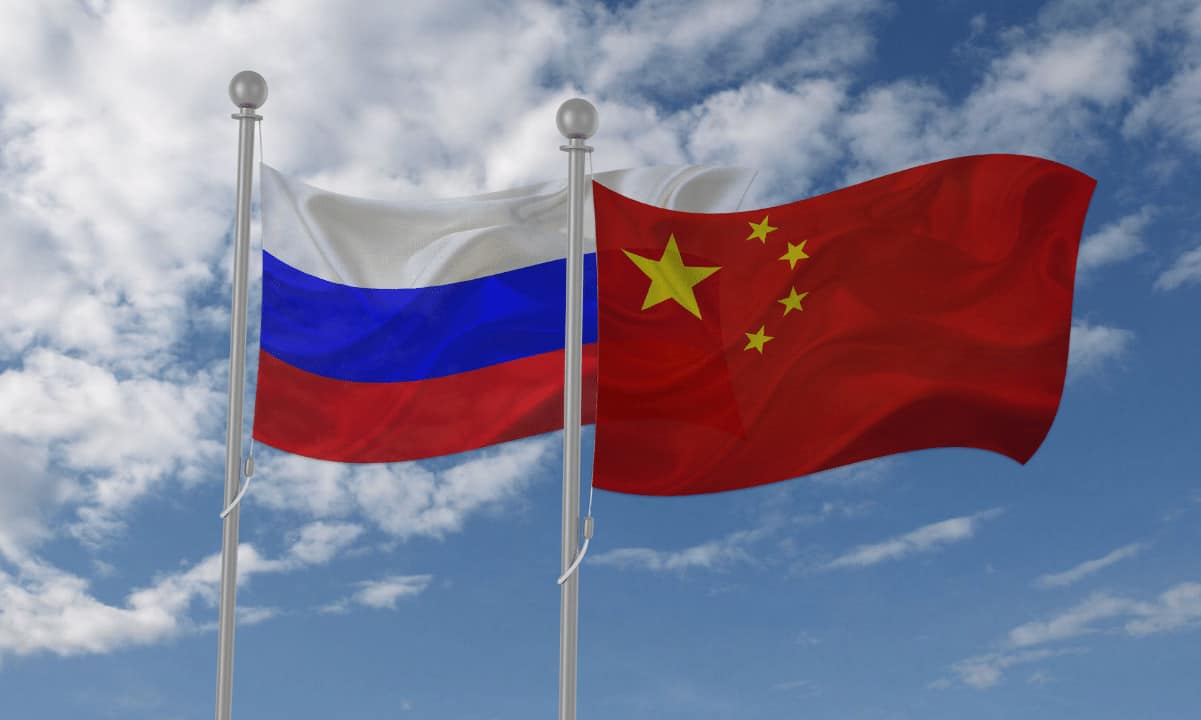VanEck Confirms China and Russia Settling Energy Trades in Bitcoin

As global trade tensions flare once again, the investment firm VanEck has confirmed that China and Russia are reportedly settling some of their energy trades using Bitcoin.
The revelation comes amid a broader trend of de-dollarization, particularly accelerated by the Trump administration’s aggressive tariff strategies targeting China and the European Union.
Countries Moving Towards Cryptocurrencies Amid Global De-dollarization
VanEck’s report, titled “Digital Assets: De-dollarization Moves Bitcoin Towards Monetary Role,” written by Matthew Sigel, places Bitcoin at the center of a rapidly shifting geopolitical and economic tension.
The report argues that recent policy shifts and rising fragmentation in global trade are accelerating the need for neutral, decentralized settlement layers, and Bitcoin is becoming a candidate of choice.
Bitcoin initially dipped from $85,000 to $81,000 following the April 2 announcement of new tariffs by the Trump administration.
However, it has since continued to outperform traditional indices like the Nasdaq across multiple timeframes, including the past decade.
VanEck points out that while slower economic growth isn’t inherently bullish for Bitcoin, the potential dovish response by central banks, particularly the Federal Reserve, could set the stage for renewed Bitcoin strength by reintroducing liquidity into the system.
But what makes this moment especially important is that adoption is no longer speculative or theoretical.
China and Russia are actively settling some of their energy transactions using Bitcoin and other digital assets.
Matthew Sigel, VanEck’s Head of Digital Assets Research, confirmed this, saying:
And they’re not alone. Bolivia has also announced plans to import electricity using cryptocurrencies, while French energy utility EDF is exploring the feasibility of using excess electricity, currently exported to Germany, to mine Bitcoin.
Bitcoin’s Role Expands Amid Dollar Weakness
The timing of these developments is crucial. Just as China and Russia make the shift toward Bitcoin, the Trump administration has escalated its trade war, announcing a 125% tariff on Chinese imports.
President Trump’s statement, released on Truth Social, accused China of exploiting global trade systems and promised that the era of “ripping off the USA” was over.
While new tariffs on other nations were delayed by 90 days, the sharp increase against China sent a clear signal that Washington is not backing down.
The immediate market reaction was bullish for Bitcoin, which jumped 5.6% within an hour of the news, climbing to $81,636.
However, this move spurred further global volatility. In response, China hiked tariffs on U.S. goods from 34% to 84% on April 9.
Notably, Russia has set the precedent before now, as a report in December shows that the country has been increasingly adopting Bitcoin for foreign trades.
The Broader De-Dollarization Movement
VanEck’s report situates these developments within the long-term trend of de-dollarization.
As Sigel notes, a weakening U.S. dollar could further entrench Bitcoin’s role as a hedge against fiat debasement and geopolitical risk.
He pointed to the U.S. Dollar Index (DXY), which has dropped over 7% year-to-date and now sits at 102.5.
A sustained decline in the dollar would amplify the “Bitcoin-as-hedge” narrative, especially amid rising global uncertainty.
This sentiment was echoed by Rabobank’s head of forex strategy, Jane Foley, who mentioned that Trump’s policies are ironically driving the very trend they aim to suppress.
“Trump threatened countries that tried to de-dollarize with extra tariffs. Ironically, his isolationist policies may drive the trend,” she told Reuters.
Indeed, even before the most recent tariffs, European analysts were already predicting a pivot away from the dollar.
VanEck advises investors to closely monitor indicators such as Federal Reserve policy, Treasury yields, Bitcoin exchange-traded product flows, and on-chain activity.
As trade tensions continue to escalate and countries search for alternatives to the dollar-centric system, Bitcoin stands at a potential inflection point.
What was once considered a speculative gamble is increasingly being adopted as a strategic tool for both trade and financial sovereignty.
The post VanEck Confirms China and Russia Settling Energy Trades in Bitcoin appeared first on Cryptonews.
VanEck Confirms China and Russia Settling Energy Trades in Bitcoin

As global trade tensions flare once again, the investment firm VanEck has confirmed that China and Russia are reportedly settling some of their energy trades using Bitcoin.
The revelation comes amid a broader trend of de-dollarization, particularly accelerated by the Trump administration’s aggressive tariff strategies targeting China and the European Union.
Countries Moving Towards Cryptocurrencies Amid Global De-dollarization
VanEck’s report, titled “Digital Assets: De-dollarization Moves Bitcoin Towards Monetary Role,” written by Matthew Sigel, places Bitcoin at the center of a rapidly shifting geopolitical and economic tension.
The report argues that recent policy shifts and rising fragmentation in global trade are accelerating the need for neutral, decentralized settlement layers, and Bitcoin is becoming a candidate of choice.
Bitcoin initially dipped from $85,000 to $81,000 following the April 2 announcement of new tariffs by the Trump administration.
However, it has since continued to outperform traditional indices like the Nasdaq across multiple timeframes, including the past decade.
VanEck points out that while slower economic growth isn’t inherently bullish for Bitcoin, the potential dovish response by central banks, particularly the Federal Reserve, could set the stage for renewed Bitcoin strength by reintroducing liquidity into the system.
But what makes this moment especially important is that adoption is no longer speculative or theoretical.
China and Russia are actively settling some of their energy transactions using Bitcoin and other digital assets.
Matthew Sigel, VanEck’s Head of Digital Assets Research, confirmed this, saying:
And they’re not alone. Bolivia has also announced plans to import electricity using cryptocurrencies, while French energy utility EDF is exploring the feasibility of using excess electricity, currently exported to Germany, to mine Bitcoin.
Bitcoin’s Role Expands Amid Dollar Weakness
The timing of these developments is crucial. Just as China and Russia make the shift toward Bitcoin, the Trump administration has escalated its trade war, announcing a 125% tariff on Chinese imports.
President Trump’s statement, released on Truth Social, accused China of exploiting global trade systems and promised that the era of “ripping off the USA” was over.
While new tariffs on other nations were delayed by 90 days, the sharp increase against China sent a clear signal that Washington is not backing down.
The immediate market reaction was bullish for Bitcoin, which jumped 5.6% within an hour of the news, climbing to $81,636.
However, this move spurred further global volatility. In response, China hiked tariffs on U.S. goods from 34% to 84% on April 9.
Notably, Russia has set the precedent before now, as a report in December shows that the country has been increasingly adopting Bitcoin for foreign trades.
The Broader De-Dollarization Movement
VanEck’s report situates these developments within the long-term trend of de-dollarization.
As Sigel notes, a weakening U.S. dollar could further entrench Bitcoin’s role as a hedge against fiat debasement and geopolitical risk.
He pointed to the U.S. Dollar Index (DXY), which has dropped over 7% year-to-date and now sits at 102.5.
A sustained decline in the dollar would amplify the “Bitcoin-as-hedge” narrative, especially amid rising global uncertainty.
This sentiment was echoed by Rabobank’s head of forex strategy, Jane Foley, who mentioned that Trump’s policies are ironically driving the very trend they aim to suppress.
“Trump threatened countries that tried to de-dollarize with extra tariffs. Ironically, his isolationist policies may drive the trend,” she told Reuters.
Indeed, even before the most recent tariffs, European analysts were already predicting a pivot away from the dollar.
VanEck advises investors to closely monitor indicators such as Federal Reserve policy, Treasury yields, Bitcoin exchange-traded product flows, and on-chain activity.
As trade tensions continue to escalate and countries search for alternatives to the dollar-centric system, Bitcoin stands at a potential inflection point.
What was once considered a speculative gamble is increasingly being adopted as a strategic tool for both trade and financial sovereignty.
The post VanEck Confirms China and Russia Settling Energy Trades in Bitcoin appeared first on Cryptonews.
 Global markets responded sharply after
Global markets responded sharply after  Russia is ramping up its use of Bitcoin for international trade to bypass Western sanctions.
Russia is ramping up its use of Bitcoin for international trade to bypass Western sanctions.
